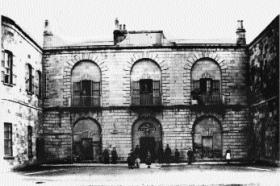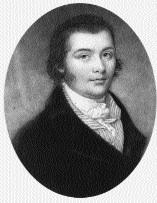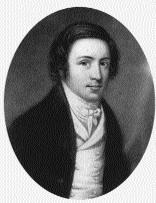Kilmainham in ‘98
Published in Issue 2 (Summer 1998), News, Volume 6

Samuel Neilson—’I scorn your power, and despise your authority, that it shall ever be my pride to have opposed.’ (Ulster Museum)
Kilmainham Gaol opened in August 1796 as the new county gaol for Dublin. It was built for ordinary criminals and debtors but within a month it had received its first political prisoners, United Irishmen from Ulster, including Samuel Neilson, a founding member. Neilson was released on bail in February 1798 on condition that he did not resume his treasonable activities in his native Belfast. Interpreting his conditions of bail somewhat literally, he was later tried for high treason after failing to raise a rebellion in Dublin in May 1798. At his trial Neilson told the court, ‘I scorn your power, and despise that authority, that it shall ever be my pride to have opposed’. Despite his defiance Neilson avoided almost certain execution by agreeing to exile in the United States where he died in 1803.
At first life for the United Irishmen in Kilmainham was comfortable. Under instructions from the government the ‘keeper’ of the prison supplied the political prisoners with port, claret, malt, beef, mutton, veal and lamb. A prisoner’s memoir noted that the gaol was
filled with visitors mostly every night. In fact its orgies were more like those of the bon vivants of a tavern than anything else—and card parties, dancing and singing memorably attended by the fair sex were frequent.
But long imprisonment often bore heavily and times were not always good. In a letter written from Kilmainham days before his execution for high treason John Sheares wrote to his sister:
The troublesome scene of life, my own dear Julia, is nearly closed, and the hand that traces these lines, will in a day or two be no longer capable of communicating to a beloved and affectionate family the sentiments of his heart.

John Sheares
And then in the hours immediately before his execution he wrote:
Adieu Julia, my light is out—the approach of darkness is like that of death, since both alike require I should say farewell forever—O my dear Family, farewell forever.
John and his brother, Henry, were executed outside Newgate Gaol on 14 July 1798.
Another Kilmainham prisoner who died on the gallows was Henry Joy McCracken, leader of the rebellion in Antrim. Following his extradition from Hamburg in 1799 Napper Tandy was lodged in the gaol. He was released three years later under the Treaty of Amiens, a brief interlude in the more than two decades of war between Britain and France, and died two years later with the rank of general of the French army. But not all of Kilmainham’s prisoners were high ranking. Between 1796 and 1802 the prison held up to fifty United Irishmen at any one time. Among the lesser known figures were fifteen year old Patrick Lynch from Lucan, Israel Milliken, engraver, James Heffy, tailor, and Patrick McCann, chemist.
Theobald Wolfe Tone, ideologue of the United Irishmen, was one of the few important revolutionary political leaders not to have been held in Kilmainham Gaol. But his ghost haunted the minds of subsequent generations of political prisoners. Five years after the 1798 Rebellion Robert Emmet was executed for leading a second attempt—he spent his last night in Kilmainham. Patrick Pearse, who was executed in the stone breakers’ yard in May 1916, believed Tone to be ‘the greatest of Irishmen [who] made articulate the dumb voices of the centuries [and who] gave Ireland a clear and precise and worthy concept of nationalism’. Above all Pearse admired Tone for his desire for action. In 1913 at an address at Tone’s grave in Bodenstown, County Kildare, he could have been talking about himself when he said that Tone was ‘thinker and doer, dreamer of the immortal dream and doer of the immortal deed’.
















